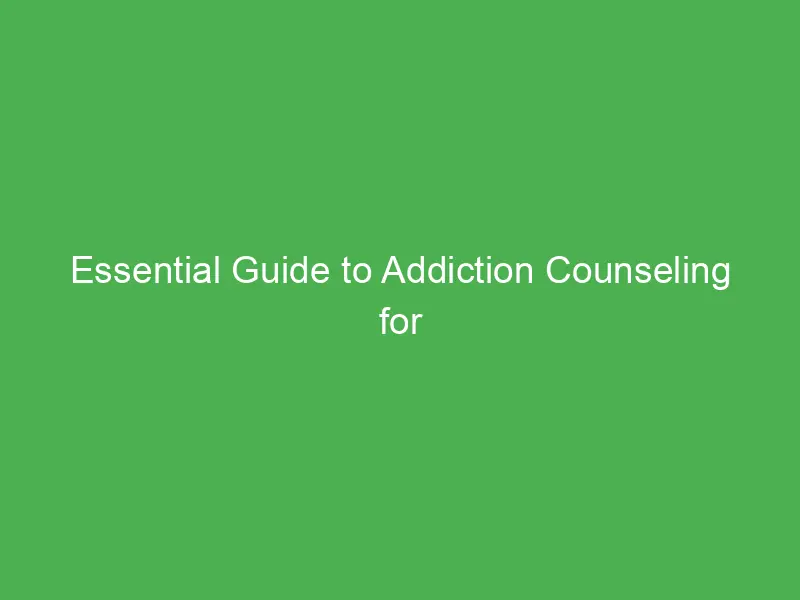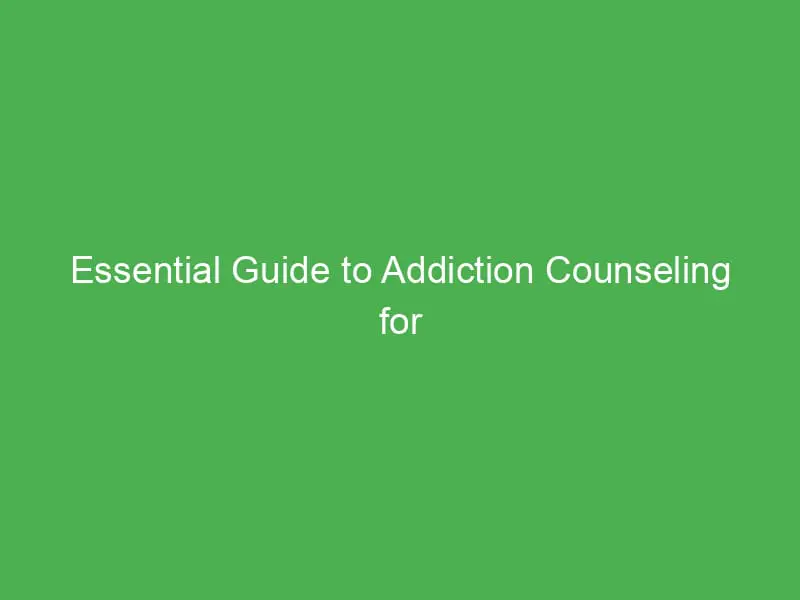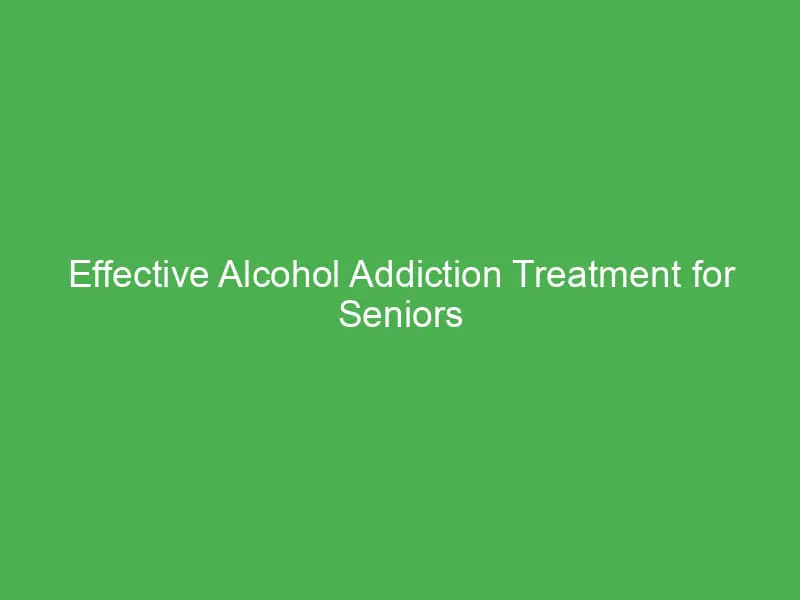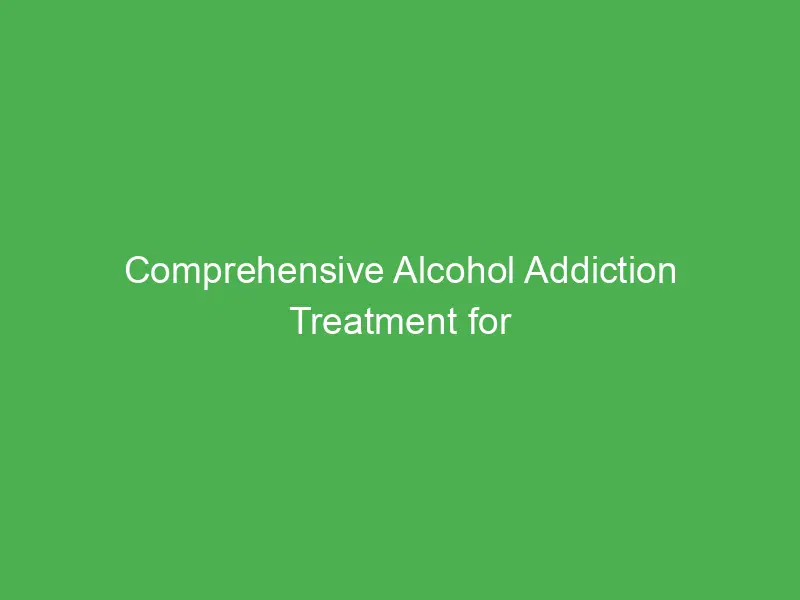As Australia’s population ages, the issue of addiction among seniors is becoming increasingly prominent. Many older Australians face unique challenges that can lead to substance misuse, including loneliness, health problems, and the loss of loved ones. Understanding these factors is crucial for developing effective addiction counselling tailored specifically for this demographic.
Addiction counselling for seniors in Australia offers a compassionate approach, focusing on the individual’s needs and experiences. With specialised programs and trained professionals, seniors can find the support they need to overcome addiction and reclaim their lives. This article explores the importance of targeted counselling for older adults, the resources available, and the benefits of seeking help in a supportive environment.
• What is addiction counseling for seniors in Australia?
Addiction counseling for seniors in Australia is a vital service tailored to address the specific needs of older adults facing substance misuse. This form of counselling focuses on several critical aspects:
- Assessment of Needs: Counselling begins with a comprehensive evaluation of the individual’s history with addiction, physical health, and emotional well-being. It’s essential to understand the underlying factors contributing to addiction, including social isolation and chronic health issues.
- Personalised Treatment Plans: Counsellors develop customised treatment plans that consider the senior’s life experiences, coping strategies, and personal goals. Effective plans often incorporate multiple approaches, including cognitive behavioural therapy (CBT) and motivational interviewing.
- Psychosocial Support: Addiction counselling offers psychosocial support to help seniors navigate their recovery. This support may include group therapy sessions with peers, helping to develop a sense of community and belonging.
- Education and Awareness: Counsellors provide education about addiction, its effects, and strategies for managing cravings. Understanding the nature of addiction empowers seniors to make informed decisions about their recovery journey.
- Family Involvement: Involving family members in the counselling process can be beneficial. Family therapy sessions help to mend relationships affected by addiction and educate loved ones about the challenges of recovery.
- Access to Resources: Counselling services connect seniors with additional resources, such as community support groups and specialised healthcare services. Knowing where to find help can significantly improve recovery outcomes.
- Follow-Up Care: After initial treatment, ongoing follow-up is crucial. Regular check-ins help maintain sobriety and address any new challenges that may arise during the recovery process.
Addiction counselling for seniors in Australia is essential for fostering healthier lifestyles and supporting individuals in overcoming the complexities of addiction. By focusing on their unique needs, this counselling ensures a compassionate and effective pathway towards recovery.
• Benefits of addiction counseling for seniors in Australia
- Improved Mental Health
Addiction counselling offers seniors a safe space to explore and manage their mental health. It can significantly reduce feelings of anxiety and depression often associated with substance abuse, leading to enhanced emotional well-being.
- Enhanced Social Connections
Counselling helps seniors build stronger social connections. Group therapy sessions foster a sense of community, combatting loneliness and isolation while encouraging interaction with others facing similar challenges.
- Tailored Support
Individualised treatment plans address the unique needs of seniors. Counselors assess personal situations, medical histories, and emotional challenges, ensuring that each senior receives the support most relevant to their circumstances.
- Educated Decision-Making
Counselling provides critical education about addiction risks, enabling seniors to make informed choices. Knowledge about substances and their impact empowers individuals to identify triggers and develop coping strategies.
- Family Involvement
Involving family members in counselling strengthens support networks. Family therapy sessions can improve communication and understanding, helping loved ones grasp the complexities of addiction and recovery.
- Access to Resources
Addiction counselling connects seniors with essential resources, such as healthcare services and community support groups. These connections are vital for long-term recovery and maintaining a healthy lifestyle.
- Ongoing Support and Follow-Up
Many counselling programmes offer ongoing support even after the initial treatment phase. Regular follow-ups encourage accountability and help sustain recovery efforts, reinforcing the skills learned during counselling.
- Lifestyle Changes
Counselling fosters lifestyle changes, promoting healthier habits and routines. Seniors learn alternative coping mechanisms, such as mindfulness and exercise, which contribute to overall well-being and reduced substance reliance.
- Reduced Stigma
Seeking counselling can help reduce the stigma surrounding addiction among seniors. By normalising conversations about substance misuse, it encourages others to seek help and strengthens community support.
By offering these benefits, addiction counselling plays a crucial role in helping seniors navigate their recovery journey, ultimately leading to healthier, happier lives.
• How to Find the Best addiction counseling for seniors in Australia
- Research Local Services
Researching local addiction counselling services is essential. Use online directories, local health service websites, and community resources to identify providers that specialise in senior care.
- Check Credentials
Checking the credentials of counselling professionals ensures they have the qualifications and experience necessary. Look for certifications in addiction counselling and relevant health care backgrounds.
- Read Reviews and Testimonials
Reading reviews and testimonials can provide insight into the effectiveness of a counselling service. Look for feedback from other seniors or their families to gauge satisfaction and outcomes.
- Evaluate Approaches
Evaluating the counselling approaches used is important. Ensure that the methods employed are compassionate and tailored for seniors, focusing on their unique experiences and needs.
- Visit Facilities
Visiting counselling facilities can help assess the environment. A welcoming, supportive atmosphere can greatly enhance comfort for seniors seeking help.
- Consider Family Involvement
Considering counselling options that encourage family involvement can be beneficial. Programs that incorporate family support can strengthen recovery efforts and create a more unified approach to addiction.
- Assess Accessibility
Assessing the accessibility of counselling services is crucial. Ensure that the location is convenient, and inquire about virtual options for those unable to attend in person.
- Verify Support Services
Verifying the availability of additional support services is essential. Look for programmes that offer ongoing support, group therapy, and educational resources for seniors and their families.
- Inquire About Follow-Up Care
Inquiring about follow-up care can help maintain progress. Consistent follow-up is key in preventing relapse and reinforcing healthy habits.
- Trust Your Instincts
Trusting personal instincts plays a significant role in choosing a counselling service. If a facility or professional doesn’t feel right, exploring other options is perfectly valid.
• Best Practices for addiction counseling for seniors in Australia
- Tailor individual treatment plans
Tailoring treatment plans to seniors’ specific circumstances is essential. Each individual has unique life experiences, health conditions, and social environments that need consideration.
- Incorporate family involvement
Encouraging family participation can strengthen support networks. It fosters a sense of community and understanding, helping seniors feel less isolated and more accountable in their recovery journey.
- Utilise psychosocial support
Providing psychosocial support is critical for addressing underlying issues that may contribute to addiction. Support groups, therapy sessions, and community activities can enhance emotional resilience and social connections.
- Educate about addiction
Educating seniors about the effects of addiction and available resources is crucial. Workshops and informational materials can help them understand addiction’s impact on health and relationships.
- Create a safe and empathetic environment
Establishing a nurturing atmosphere where seniors feel safe to express themselves can boost engagement. A compassionate approach reduces stigma and encourages open conversations about their struggles.
- Monitor and modify treatment regularly
Regularly assessing the effectiveness of treatment plans allows for timely modifications. Continuous monitoring helps address emerging needs and keeps the recovery process on track.
- Facilitate access to holistic resources
Connecting seniors with additional services, such as mental health support, physical wellness programmes, and social activities, fosters comprehensive recovery. A holistic approach addresses both physical and emotional well-being.
- Ensure continuity of care
Implementing ongoing follow-up care is vital for sustainability. Consistent check-ins and reassessment of needs help maintain progress, reduce relapse chances, and ensure lasting recovery.
- Promote sober-friendly activities
Encouraging participation in sober-friendly activities, such as art classes, book clubs, or exercise groups, provides fulfilling alternatives to substance use. Engaging in enjoyable pursuits can help seniors build healthier relationships and lifestyle choices.
• Common Challenges with addiction counseling for seniors in Australia
- Stigma surrounding addiction
Seniors often face societal stigma related to addiction, which can deter them from seeking help. This fear of judgement may prevent older adults from entering counselling programmes, making it vital to create non-judgemental environments.
- Physical health issues
Many seniors have existing physical health conditions that complicate treatment. Managing chronic illnesses while addressing addiction requires a tailored approach, ensuring that counselling considers both mental and physical health needs.
- Cognitive decline
Cognitive impairments, such as dementia or memory loss, can impede participation in counselling sessions. Counsellors must adapt their techniques and materials to suit varying levels of cognitive ability, ensuring understanding and engagement.
- Loneliness and social isolation
Seniors often experience loneliness, which can exacerbate addiction issues. Integrating group therapy sessions fosters social connections, providing emotional support and reducing feelings of isolation during the recovery process.
- Access to services
Geographical barriers can limit access to addiction counselling for some seniors, particularly in rural areas. Increasing the availability of telehealth services can help bridge this gap, allowing seniors to receive care without travel difficulties.
- Family dynamics
Family involvement is crucial in addiction recovery, yet complex family dynamics may pose challenges. Counsellors should encourage open communication among family members, providing guidance on how to support their loved ones effectively during recovery.
- Transportation difficulties
Many seniors face transportation issues that hinder their ability to attend appointments. Offering transportation assistance or remote counselling options can alleviate this barrier, ensuring consistent participation in treatment.
- Financial constraints
Financial limitations may deter seniors from accessing necessary counselling services. Providing information on subsidised programmes and community resources can help navigate these challenges, ensuring that cost isn’t a barrier to recovery.
Key Takeaways
- Targeted Counselling: Addiction counselling for seniors in Australia is specifically designed to address the unique challenges faced by older adults, such as loneliness and health issues.
- Personalised Support: Each senior receives a customised treatment plan that incorporates their personal experiences, health status, and specific coping strategies for effective recovery.
- Community Connection: Counselling fosters social connections through group therapy, helping seniors combat isolation and build supportive relationships with peers.
- Family Involvement: Engaging family members in the counselling process enhances support networks and improves communication, which is vital for recovery.
- Ongoing Care: Continuous follow-up care after initial treatment is essential for maintaining sobriety and addressing new challenges as they arise during recovery.
- Access to Resources: Counselling connects seniors to vital community resources and healthcare services, facilitating a holistic approach to recovery and wellness.
Key Takeaways: Tailored Addiction Counselling for Seniors in Australia
Addiction counselling for seniors in Australia is essential for addressing the unique challenges faced by older adults. By offering tailored support and understanding, these programmes enable seniors to navigate the complexities of addiction recovery. The focus on personalised treatment plans and family involvement creates a nurturing environment that fosters healing and resilience.
As the stigma surrounding addiction diminishes, more seniors can access the help they need. This not only improves their mental health but also enhances their social connections and overall quality of life. With ongoing support and resources, seniors can embrace healthier lifestyles and find renewed purpose in their golden years.
Looking for more sober travel inspiration? Find your next adventure on our Homepage.
Frequently Asked Questions
What is the main focus of the article on addiction among seniors in Australia?
The article highlights the growing issue of addiction among Australia’s ageing population and the unique challenges seniors face, such as loneliness and health problems. It emphasises the importance of tailored addiction counselling that caters to their specific needs and experiences.
Why is tailored addiction counselling important for older adults?
Tailored addiction counselling is crucial for older adults because it addresses their individual needs, offers personalised treatment plans, and provides psychosocial support. This approach helps seniors navigate their recovery journey effectively and fosters healthier lifestyles.
What components are included in addiction counselling for seniors?
Addiction counselling for seniors involves a comprehensive assessment of needs, personalised treatment plans, education about addiction, family involvement, access to resources, and ongoing follow-up care. These components aim to support seniors in their recovery process.
What benefits does addiction counselling offer seniors?
The benefits of addiction counselling for seniors include improved mental health, enhanced social connections through group therapy, tailored support for individual needs, educated decision-making regarding addiction risks, and reduced stigma surrounding addiction.
How can seniors find the best addiction counselling services in Australia?
Seniors can find suitable addiction counselling services by researching local options, checking professionals’ credentials, reading reviews, evaluating counselling approaches, visiting facilities, and considering family involvement in the process.
What are some common challenges faced in addiction counselling for seniors?
Common challenges include societal stigma, existing health issues, cognitive decline, loneliness, access to services in rural areas, transportation difficulties, and financial constraints, which may hinder seniors from seeking and receiving counselling support.
Why is family involvement important in addiction counselling for seniors?
Family involvement strengthens the support network for seniors, promotes emotional resilience, and enhances the effectiveness of the counselling process. It helps to create a supportive home environment for recovery and allows families to better understand addiction-related challenges.
What best practices should be followed in addiction counselling for seniors?
Best practices include tailoring treatment plans to individual circumstances, facilitating family involvement, creating a safe environment, providing holistic resources, ensuring continuity of care, and promoting sober-friendly activities to foster healthier lifestyle choices.

Quit drinking on 23 July 2021 after a two-day bender and swapped bars for border crossings and 12-step meetings. Three sober years, 36 countries, 113 travellers (totally dry), fuelled by street food, jelly babies, and a broken Google Maps app. Wandersober is my journal, my SEO lab, and my mission. Featured in GQ, Mirror, Evening Standard, MarketWatch, and more.






